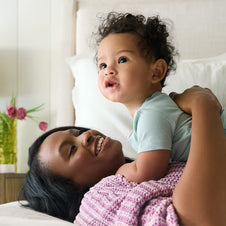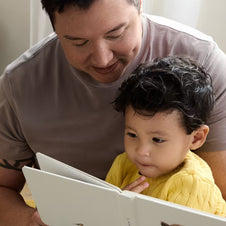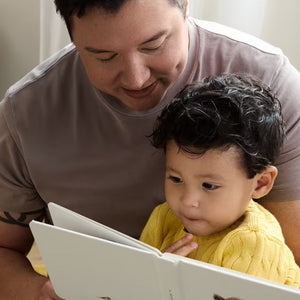Do you know one of the most common causes of toddler sleep problems?
Moving out of the crib too early!
It’s true! Research(1) actually shows that waiting until your little one is closer to 3 years old results in decreased bedtime struggles, fewer night wakings, and longer stretches of night sleep.
If your toddler struggles with sleep, transitioning out of the crib is rarely “the fix.” In fact, it usually makes the issues worse.
Before 2 ½ years old, most little ones simply do not have the developmental capacity to understand the statement: “You need to stay in bed.” I know it can be exciting to create a "big boy" or "big girl" room, but keeping your toddler safely in the crib just a bit longer will actually make the transition to a toddler bed much easier.
Every little one WILL eventually transition to a bed (I know, I know. If only we could keep them little and in the crib forever). Let me share with you some of the common signs your toddler is ready to transition to a toddler bed and how to make the transition.
Taking Cara Babies Classes
How long do babies sleep in cribs?
Most babies sleep in a crib until they are at least 2 years old. But, there are many who can safely remain in a crib until closer to their third, or even fourth, birthday.
If your toddler is sleeping well and safely in a crib, there’s no reason you have to make a change. Please be sure to speak with your pediatrician if you have any concerns about your toddler safely remaining in their crib.
When is the best time to transition to a toddler bed?
Most toddlers will be ready to move to a bed between 2-4 years old. Current research(1) shows that waiting until your child is closer to 3 can help to make the transition to a bed more successful.
What are the signs your child is ready for a toddler bed?
1. Your toddler is consistently climbing out of the crib.
This is simply a safety issue. If a toddler is regularly climbing out of the crib, the crib is no longer a safe sleeping space for them.
However...before you transition for ONLY this reason, here are some ways you may be able to keep your child safely in the crib a bit longer:
-
Make sure the crib mattress is in the lowest position.
-
Consider turning your toddler’s crib around. Some cribs are taller in the “back” and shorter in the “front.” Turning the crib around can make it more difficult for your toddler to climb over the top.
-
Push the crib into the corner of the room. This blocks two possible sides of the crib for climbing.
-
Put your toddler in a sleep sack when sleeping in the crib. This will make it more difficult to lift a leg up and over the side of the crib.
-
Use a “two-way talk” baby monitor and firmly say, “NO” if you see your little one beginning to crawl out of the crib.
Safety Tip: Crib tents are not a safe option for keeping your child in a crib.
You can find some of my favorite toddler bed transition products here.
2. Your toddler is asking for a big girl or big boy bed.
Some little ones never crawl out of the crib, but they do eventually want to sleep in a more adult-style bed. Your toddler may have seen a friend or sibling with a toddler bed, or they may have just decided the crib feels like a baby bed. When your toddler starts asking, it’s time to start thinking about the transition. We don’t typically see this until at least 3 years old.
3. Your child is simply too big for the crib.
Maybe the crib size is keeping your toddler from getting comfortable or maybe they’re getting too heavy to lift in and out of the crib for nights and naps. Many children reach this point at around 3 - 3 ½ years old. It simply isn’t practical for them to remain in a crib any longer.
If you haven’t seen any of these signs yet, please delay your toddler’s move to the toddler bed, especially if sleep isn’t going well in the crib.
When NOT to transition to a toddler bed:
You have a new baby who needs the crib.
Transitioning in the few months prior to your new baby’s arrival can make your toddler feel that they’re being “pushed aside” for the baby. It can also just create more stress for everyone. Times of big necessary transitions – like going from one baby to two (or three or four) – are usually not great times to add any unnecessary transitions.
Instead, consider buying/borrowing a crib or using a bassinet, portable crib, or play yard for your new baby until your toddler is ready. (If you haven’t yet taken my newborn class, know that it can help set your new baby up to be a great sleeper with no crying involved.)
You think it might magically fix sleep.
If sleep is a mess, transitioning to the toddler bed often causes sleep to become more difficult.
Many times, what you’re seeing is your little one simply exercising their voice. I’ve got a few great tips for you if your toddler is fighting bedtime. Hint: They do NOT include a toddler bed.
Others are telling you your little one SHOULD be out of the crib.
My youngest son was safely sleeping in the crib until he was almost 3 and a half...Other people teased me about whether he would take the crib with him to college. I just smiled and knew that our whole family was sleeping well because I didn’t rush him when he wasn’t ready.
Expert Tip: You don’t have to transition to a toddler bed simply because your child is ready to potty train.
If you're struggling with sleep, I can help! For babies under 2, the 5–24 Month Collection will give you tools and walk you step-by-step through a plan to conquer nights, days, and every bump along your sleep journey. For those older than 2, Toddler Sleep Training can teach you developmentally-appropriate strategies for independent nights, successful days, and smooth transitions through the toddler years.
How to transition to a toddler bed:
Remember, there’s no rush to get safely-sleeping toddlers out of their cribs, but if you’ve decided it is the right time for your toddler to transition to a toddler bed, here are some tips to help make the transition easier for you and your family.
1. Prepare the room
With the new-found freedom that comes with no longer being confined to the crib, it’s important to look for any potential safety issues within your child’s room. Get down on your hands and knees and see the room from your child’s perspective. Is there anything that could fall on them? Anything they can get a little finger stuck in? Any choking or tripping hazards? Be sure to:
-
Anchor tall furniture to the wall. Toddlers love to climb and explore! Make sure furniture is properly anchored to the wall (think dressers, bookshelves, changing tables, etc). If a tall piece of furniture can’t be safely anchored, you may have to switch it out.
-
Cover all electrical outlets. Get on your toddler’s level, looking around the entire room to identify all outlets that are within reach of your toddler and make sure they are covered.
-
Adjust any decorations that may now be accessible. Once your little one is mobile, it may be time to rethink room decorations (this may include things such as wall bookshelves, photo frames, or other decor). While you don’t have to get rid of them, make sure they are mounted in a way that makes them safe if they were to be pulled on.
-
Check the room for any loose cords. The hanging cords on window blinds are a major safety concern in any area of your home. Cords of electronics, like your baby monitor or sound machine can also be hazardous. You can tie them up and out of reach, or opt for cordless choices.
-
Consider safety issues outside of the room. If your child can open the door and You can also consider adding a door alarm so you’ll be alerted if your toddler leaves the room
Expert Tip: Make it your goal for the entire room to be as safe as the crib was
You can find some of my favorite safety products here.
2. Involve your child in the process
Allowing toddlers to be involved in the transition will make the process so much easier. Their involvement in the process will help get them excited and give them a sense of pride and ownership. So, how do we do that?
-
Talk about the new “big kid bed” before it’s time. Reading books about the transition can be a great way to do this.
-
Let your child make simple choices. Think: the color of the sheets, the print or character on the comforter, which end of the bed the pillow goes on, or which stuffed animal gets to join them in the new bed.
Expert Tip: If you are considering a floor bed for your little one, you can read all about floor beds in my blog Montessori Floor Beds.
3. Communicate clear expectations
Toddlers thrive when they have clear boundaries. Communicating your expectations ahead of time helps prevent bedtime battles. Leading up to and on the day you’re planning to transition to the toddler bed, talk to your child about how they’re going to stay in bed until you come to get them in the morning. You may even want to “practice” during the day by having them show you how they can stay in bed until you turn on the lights.
Expert Tip: If you haven’t considered an OK-to-Wake Clock, this can be a great visual reminder. “You’re going to stay in bed until the light turns green!”
4. Maintain your normal bedtime routine
Maintaining your normal bedtime routine provides safety and security to your toddler as they are preparing for this transition. Ideally, the only change is that at the end of the bedtime routine, you’re tucking your little one into a bed instead of a crib.
Expert Tip: Maintain a confident attitude throughout the bedtime routine. Little ones mirror our emotions so if you’re cool and calm, they’ll know everything is going to be just fine. On the other hand, if you seem anxious or unsure about this transition, they will be too. Rest assured they can do this, and so can you.
5. Have a plan if they get out of bed
Getting out of bed may or may not happen after you tuck your little one in that first night. It’s not unusual for toddlers to test boundaries, even if you've laid them out ahead of time, so having a plan is crucial for seeing success. So what’s your plan? It could be as simple as this: Any time your toddler gets out of bed, you’ll calmly walk them back to bed, tuck them back in, and leave the room.
What if my child begins to wake early in the morning after transitioning to a toddler bed?
Your toddler may wake up a bit earlier in the morning. Their toddler bed isn’t yet familiar, which can make it harder to drift back to sleep in those early morning hours. This issue may resolve itself as your toddler becomes more familiar with their new bed. But if early morning wakings are a struggle, please see Is Your Toddler Waking Up Too Early?. I find that an OK-to-Wake clock can be very helpful for many toddlers who struggle with waking up early.
Why won’t my 2 year old stay in their bed?
If your 2 year old is getting out of bed frequently, it could be a sign they’re just not ready for the transition. A 2 year old has a hard time developmentally understanding "stay in bed" because their impulse control(2) is so immature. This is why I recommend waiting until children are over 3-years-old for this transition. If your little one is under 3 and struggling, consider going back to the crib if it's a safe option.
Tips for toddler bed success
When your toddler is ready to transition to a toddler bed, follow these tips to make it a successful transition for the whole family!
-
Start with a great sleeper!
This will make all the difference and also help with other major transitions and milestones in your child’s life. If you’re currently struggling with sleep and your child is under 2 years old, check out my 5–24 Month Collection. If your toddler’s sleep is a struggle, my Toddler Sleep Training class can help! I’ll give you the tools you need to meet your toddler where they are developmentally and help create a great sleeper. It’s never too late to set loving boundaries around sleep to help your toddler grow into a successful sleeper. -
Wait until your toddler is closer to 3 years old or older to make the move to a toddler bed if you can do this safely.
-
Give your child time to prepare by talking frequently with them about what will happen.
-
When you make the transition to a toddler bed, stay consistent with your bedtime routine and expectations around sleep.
-
Stay calm and validate your child’s feelings surrounding this big transition.










